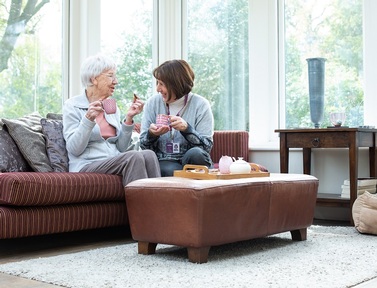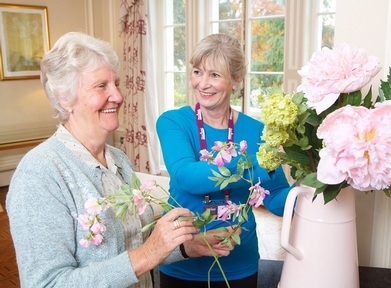'I get a buzz helping people': Meet the 'unretired' who are working in care
The Centre for Social Justice (CSJ), a think tank, has put forward the idea of a state pension age of 75 by the year 2035, but whilst the proposal has been widely criticised, new data suggests many older people regret retiring and are choosing to go back to work, or to ‘unretire’.
The flexibility of working hours and sociable nature of care work is attracting older people who may be bored with retirement and who want to keep active and earning.

Home care provider Home Instead Senior Care recently polled a cross-section of retired people across the UK and the responses revealed that a quarter of over-65s felt they gave up their careers too soon, whilst a fifth of those surveyed said they felt deeply disappointed by their retirement.
Martin Jones, the chief executive of Home Instead Senior Care said: “This is an extremely interesting piece of research that lifts the lid on retirement and how over 65s feel about life as a retiree. It is significant that a large portion of those who were surveyed felt that they could have carried on working beyond the age at which they retired.”
Former police officers unretire to work in personal care
Ex-police officer, Kathleen Aubeelack, who lives in Ealing, West London, missed the camaraderie and activity of being in the police force.
The 59-year-old was an officer for 35 years and then went into nursing for five years following that. She retired last September after 40 years of work but soon grew restless and only lasted four months before she knew she wanted to do something else.
Ms Aubeelack wanted part-time work that was flexible to fit around her personal life and family commitments, but she also wanted something that would keep her brain active. Care work seemed to tick a lot of these boxes and the former officer has been helping six clients with their personal care ever since. She has built up a good rapport with those clients and enjoys her job.
The former police officer says: “Working part-time allows me to enjoy the best parts of retirement including some quality of life and time with my friends and family as well as indulging in my two main hobbies – travel and ballroom dancing – in fact I’ve travelled to various parts of the world competing in my dance, and it’s great to be able to have a good balance now.”

Gil Martin from Northwich is another former police officer who became a care worker after becoming fed up with retirement. He officially retired in 2013. His previous career saw him working closely with communities in Southwark as a Met policeman, although he continued doing work around the country training officers and the general public on how to deal with crime and antisocial behaviour.
He got into caring with Home Instead in 2018. He wanted something part-time so he could keep doing training, and he missed working with people and so care work was perfect for him.
One of Mr Martin’s clients, John, was also in the police force and the care worker recently took him on a visit to his old police station.
Another of his clients is a 99-year-old Dunkirk Veteran; Mr Martin stayed up late polishing his medals before Gallipoli Memorial Day.
Retirees miss ‘fun’ and ‘companionship’ of working
In the Home Instead survey, data revealed that retirement for many is a lonely time with a lack of routine and mental and physical stimulus.
Over 25 percent of respondents admitted they felt they had no real routine in their day-to-day lives, with a third saying they felt they have lost their purpose in life as a result of retiring.
Mr Jones said: “It is interesting too that so many people said they missed the ‘fun’ of work and the companionship aspect of it. At Home Instead, we have a large number of caregivers in their 60s, 70s and 80s who particularly enjoy the companionship the role offers, as well as a sense of purpose and fulfilment it brings looking after people who may be lonely and need some extra support at home.”
In the CSJ report published this week, it suggested increasing the pension age from the current age of 65 to 70 by 2028, and then to 75 by 2035; a move which Baroness Altmann described as a ‘betrayal of hard-working people’ in a column for the Daily Mail.
However, recent research has shown not everyone wants to fully retire at the current state pension age.
In the UK, 25 per cent of people unretire and about half of this number go back within five years of retirement, according to research in March 2019 in Aging & Society.
But whilst there is a growing trend for retirees to go back to work, many people who unretire go on to work part-time rather than full-time.

Older care workers may share similar interests
Eighty-two-year-old Mike Neale retired from running his own successful embroidery business at 77 but found himself wanting to earn some money whilst keeping himself active and having an interest outside of the family.
He now works with Home Instead and has been a care worker for three and a half years. Currently, he provides around 12.5 hours of care per week with some regular clients.
Mr Neale provides a combination of personal care, home help and companionship care. This can often be simply sitting and having a chat with a client in their own home. He says: “Companionship care is really very rewarding as loneliness can be an issue for older people and the care worker can help to alleviate that.
He believes being older can be advantageous as a care worker as there may be a time when you are caring for someone and they share similar interests or backgrounds, or just remember various moments in time that someone younger wouldn’t.
The former businessman clearly feels care work pays him back. He says: “I get a lot of satisfaction from feeling youthful and I also get a certain amount of buzz from helping people.”
Latest Features News
 28-Nov-19
2019 Election: Labour pledges £10.8 bn for free personal care while Boris Johnson sidelines social care
28-Nov-19
2019 Election: Labour pledges £10.8 bn for free personal care while Boris Johnson sidelines social care
 18-Oct-19
Podcast: Wendy Mitchell and dementia: 'My biggest fear is not knowing who my daughters are'
18-Oct-19
Podcast: Wendy Mitchell and dementia: 'My biggest fear is not knowing who my daughters are'
 30-Sep-19
World's oldest diver aged 96 says 'never accept the fact you are getting old'
30-Sep-19
World's oldest diver aged 96 says 'never accept the fact you are getting old'
 27-Sep-19
Exclusive: Care minister backs care workers' call for time off to grieve and attend funerals
27-Sep-19
Exclusive: Care minister backs care workers' call for time off to grieve and attend funerals
 20-Sep-19
Podcast: Gyles Brandreth urges care workers to learn poetry with elderly
20-Sep-19
Podcast: Gyles Brandreth urges care workers to learn poetry with elderly